人教版七下册Unit-7知识点总结
人教版七年级英语下册各知识点归纳总结
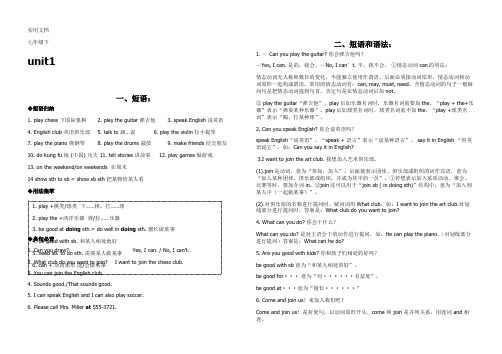
七年级下unit1一、短语:◆短语归纳1. play chess 下国际象棋2. play the guitar 弹吉他3. speak English 说英语4. English club 英语俱乐部5. talk to 跟…说6. play the violin 拉小提琴7. play the piano 弹钢琴8. play the drums 敲鼓9. make friends 结交朋友10. do kung fu 练 (中国) 功夫 11. tell stories 讲故事 12. play games 做游戏13. on the weekend/on weekends 在周末14 show sth to sb = show sb sth 把某物给某人看◆用法集萃◆典句必背1. Can you draw? Yes, I can. / No, I can’t.2. What club do you want to join? I want to join the chess club.3. You can join the English club.4. Sounds good./That sounds good.5. I can speak English and I can also play soccer.6. Please call Mrs. Miller at 555-3721.二、短语和语法:1. — Can you play the guitar? 你会弹吉他吗?—Yes, I can. 是的,我会。
—No, I can’t. 不,我不会。
①情态动词can的用法:情态动词无人称和数目的变化,不能独立使用作谓语,后面必须接动词原形,情态动词和动词原形一起构成谓语。
常用的情态动词有:can, may, must, need。
含情态动词的句子一般疑问句是把情态动词提到句首,否定句是在情态动词后加not。
人教版七年级英语下册各单元知识点汇总
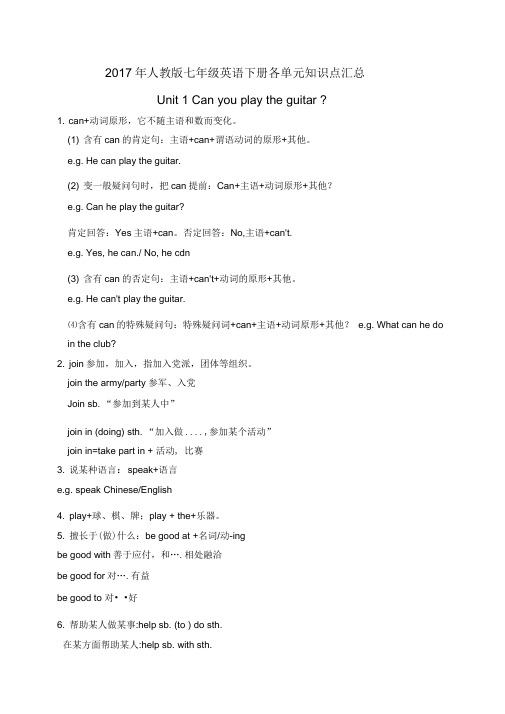
2017年人教版七年级英语下册各单元知识点汇总Unit 1 Can you play the guitar ?1. can+动词原形,它不随主语和数而变化。
(1) 含有can的肯定句:主语+can+谓语动词的原形+其他。
e.g. He can play the guitar.(2) 变一般疑问句时,把can提前:Can+主语+动词原形+其他?e.g. Can he play the guitar?肯定回答:Yes主语+can。
否定回答:No,主语+can't.e.g. Yes, he can./ No, he cdn(3) 含有can的否定句:主语+can't+动词的原形+其他。
e.g. He can't play the guitar.⑷含有can的特殊疑问句:特殊疑问词+can+主语+动词原形+其他? e.g. What can he doin the club?2. join参加,加入,指加入党派,团体等组织。
join the army/party 参军、入党Join sb. “参加到某人中”join in (doing) sth. “加入做.... ,参加某个活动”join in=take part in + 活动, 比赛3. 说某种语言:speak+语言e.g. speak Chinese/English4. play+球、棋、牌;play + the+乐器。
5. 擅长于(做)什么:be good at +名词/动-ingbe good with善于应付,和….相处融洽be good for对….有益be good to 对• •好6. 帮助某人做某事:help sb. (to ) do sth.在某方面帮助某人:help sb. with sth.7. 想要做某事:want to do sth想要某人做某事:want sb. to do sth.需要某人/时间做某事:need sb./some time to do sth.叫某人做某事:ask sb. to do sth.教某人做某事:teach sb. to do sth.让某人做某事:let sb. do sth.8. ---What club do you want to join ?---1 want to join the chess club and the basketball club.9. ---What club does Tom want to join?---He wants to join the swimming club .10. He can't play the violin or the piano.Can you help kids with swimming?11. ---Why do you want to join the English club?---Because I want to learn Englishwell.12. go for a swim=go swimming 去游泳13. show sb. sth.=show sth. to sbll 示某物给某人看Please show some pictures to me.=Please show me some pictures.14. talk to/with sb.和••交谈;talk about 谈论某事15. 交朋友make friends16. 在周末:on the weekendon weekends/at weekendsUnit 2 What time do you go to school ?1、what time和when引导的特殊疑问句。
人教版英语七年级下册课本知识点梳理
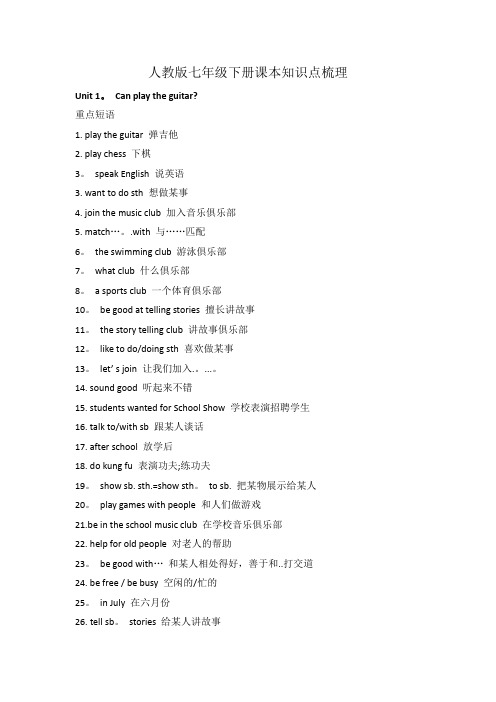
人教版七年级下册课本知识点梳理Unit 1。
Can play the guitar?重点短语1. play the guitar 弹吉他2. play chess 下棋3。
speak English 说英语3. want to do sth 想做某事4. join the music club 加入音乐俱乐部5. match…。
.with 与……匹配6。
the swimming club 游泳俱乐部7。
what club 什么俱乐部8。
a sports club 一个体育俱乐部10。
be good at telling stories 擅长讲故事11。
the story telling club 讲故事俱乐部12。
like to do/doing sth 喜欢做某事13。
let’ s join 让我们加入.。
...。
14. sound good 听起来不错15. students wanted for School Show 学校表演招聘学生16. talk to/with sb 跟某人谈话17. after school 放学后18. do kung fu 表演功夫;练功夫19。
show sb. sth.=show sth。
to sb. 把某物展示给某人20。
play games with people 和人们做游戏21.be in the school music club 在学校音乐俱乐部22. help for old people 对老人的帮助23。
be good with…和某人相处得好,善于和..打交道24. be free / be busy 空闲的/忙的25。
in July 在六月份26. tell sb。
stories 给某人讲故事27。
make friends with…和某人交朋友28。
call sb. at ……给某人打电话……29。
on the weekend 在周末30. help sb.(to)do sth. 帮助某人做某事31. help sb。
新人教版七年级下册英语知识点总结
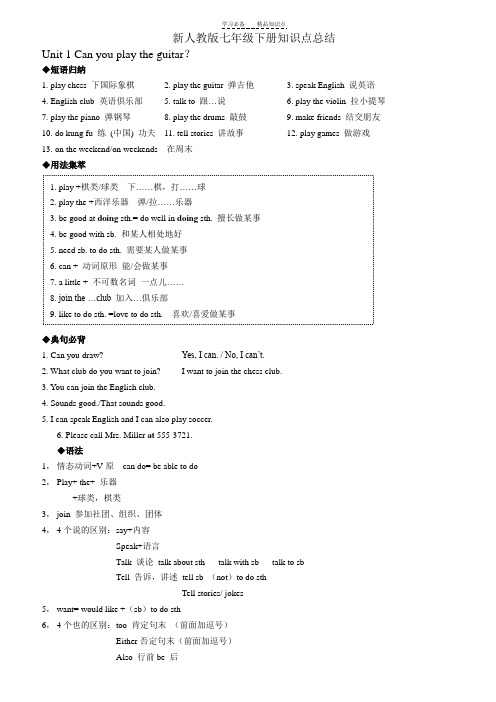
新人教版七年级下册知识点总结Unit 1 Can you play the guitar?◆短语归纳1. play chess 下国际象棋2. play the guitar 弹吉他3. speak English 说英语4. English club 英语俱乐部5. talk to 跟…说6. play the violin 拉小提琴7. play the piano 弹钢琴8. play the drums 敲鼓9. make friends 结交朋友10. do kung fu 练(中国) 功夫11. tell stories 讲故事12. play games 做游戏13. on the weekend/on weekends 在周末◆用法集萃1. play +棋类/球类下……棋,打……球2. play the +西洋乐器弹/拉……乐器3. be good at doing sth.= do well in doing sth. 擅长做某事4. be good with sb. 和某人相处地好5. need sb. to do sth. 需要某人做某事6. can + 动词原形能/会做某事7. a little + 不可数名词一点儿……8. join the …club 加入…俱乐部9. like to do sth. =love to do sth. 喜欢/喜爱做某事◆典句必背1. Can you draw? Yes, I can. / No, I can’t.2. What club do you want to join? I want to join the chess club.3. You can join the English club.4. Sounds good./That sounds good.5. I can speak English and I can also play soccer.6. Please call Mrs. Miller at 555-3721.◆语法1,情态动词+V原can do= be able to do2,Play+ the+ 乐器+球类,棋类3,join 参加社团、组织、团体4,4个说的区别:say+内容Speak+语言Talk 谈论talk about sth talk with sb talk to sbTell 告诉,讲述tell sb (not)to do sthTell stories/ jokes5,want= would like +(sb)to do sth6,4个也的区别:too 肯定句末(前面加逗号)Either否定句末(前面加逗号)Also 行前be 后As well 口语中(前面不加逗号)7,be good at+ V-ing=do well in 擅长于be good for 对…有益(be bad for对…有害)be good to 对…友好(good 可用friendly,nice,kind替换)be good with和…相处好=get on/ along well with8,特殊疑问句的构成:疑问词+一般疑问句9,How/ what about+V-ing …怎么样?(表建议)10,感官动词(look, sound, taste, smell, feel)+adj/ like11,选择疑问句:回答不能直接用Yes或者No,要从中选择一个回答12,students wanted for school show(wanted表示招募,含有被动意义)13,show sth to sb=show sb sth give sth to sb=give sb sth14,help sb (to)do sthHelp sb with sthWith sb’s help= with the help of sbHelp oneself to 随便享用15,be busy doing sth/ be busy with sth16,need to do sth17,be free= have time18,have friends= make friends19,call sb at +电话号码20,on the weekend= on weekends21,English-speaking students 说英语的学生(带有连词符,有形容词性质)22,do kung fu表演功夫◆话题写作Dear Sir,I want to join your organization (组织) to help kids with sports, music and English. My name is Mike. I am 15 years old. I’m a student in No. 1 Middle school. I can play the guitar well. I can sing many songs. I can swim and speak English well, too. I think I can be good with the kids. I also do well in telling stories.I hope to get your letter soon.Yours,MikeUnit 2 What time do you go to school?1,问时间用what time或者whenAt+钟点at 7 o’clock at noon/ at night(during/ in the day)On+ 具体某天、星期、特指的一天on April 1st on Sunday on a cold winter morningIn +年、月、上午、下午、晚上2,时间读法:顺读法逆读法:分钟≤30用past five past eight(8:05)half past eight(8:30)分钟>30用to a quarter to ten(9:45)整点用…o’clock 7 o’clock(7:00)3,3个穿的区别:wear 表状态,接服装、手套、眼镜、香水等Put on 表动作,接服装Dress 表动作,接sb./ oneself get dressed穿衣3,感叹句:How+adj.+主谓!How+adj.+a/an +n单+主谓!What+ a/an +adj.+ n单+主谓!What+ adj.+ n复/ 不可数+主谓!4,from…to…5,be/ arrive late for6,频度副词(行前be 后)always usually often sometimes seldom hardly never7,一段时间前面要用介词forfor half an hour for five minutes8,eat/ have…for breakfast/ lunch/ dinner/ supper9,either…or10,a lot of=lots of11,it is +adj.+for sb. +to do sth. (adj.修饰to do sth.)It is important for me to learn English.it is +adj.+of sb. +to do sth. (adj.修饰sb.)It is kind/ friendly/ nice of you to help me.◆用法集萃1. at + 具体时间点在几点(几分)2. eat breakfast/ lunch/dinner 吃早饭/午饭/晚饭3. thirty\half past +基数词……点半4. fifteen\a quarter to +基数词差一刻到……点5. take a/an +名词从事……活动6. from …to … 从……到……7. need to do sth 需要做某事◆短语归纳1. what time 几点2. go to school 去上学3. get up 起床4. take a shower 洗淋浴5. brush teeth 刷牙6. get to 到达7. do homework 做家庭作业8. go to work 去上班9. go home 回家10. eat breakfast 吃早饭11. get dressed 穿上衣服12. get home 到家13. either…or… 要么…要么… 14. go to bed 上床睡觉15. in the morning/ afternoon/ evening 在上午/下午/晚上16. take a walk 散步17. lots of=a lot of 许多,大量18. radio station 广播电台19. at night 在晚上20. be late for=arrive late for 迟到◆典句必背1. What time do you usually get up? I usually get up at six thirty.2. That’s a funny time for breakfast.3. When do students usually eat dinner? They usually eat dinner at a quarter to seven in the evening.4. In the evening, I either watch TV or play computer games.5. At twelve, she eats lots of fruit and vegetables for lunch.6. She knows it’s not good for her, but it tastes good.7. Here are your clothes.◆话题写作主题:谈论日常作息习惯My School DayI am a student. I usually get up at seven, and I eat breakfast at seven thirty. Then I go to school at eight. School starts at eight thirty. I eat lunch at twelve. I go home at 17:00. I often eat dinner at 19:00 and then play the piano. I do my homework at 20:00. At 22:00, I go to bed.Unit 3 How do you get to school?1,疑问词How 如何(方式)how long 多长(时间)答语常用“(For/ about +)时间段”how far多远(距离)答语常用“(It’s +)数词+miles/ meters/ kilometers”how often多久一次(频率)答语常用“Always/ often/ every day/…”或“次数+时间”等表频率的状语How soon多快,多久以后,常用在将来时中。
人教版人教版七年级下册英语知识点复习(完整版)
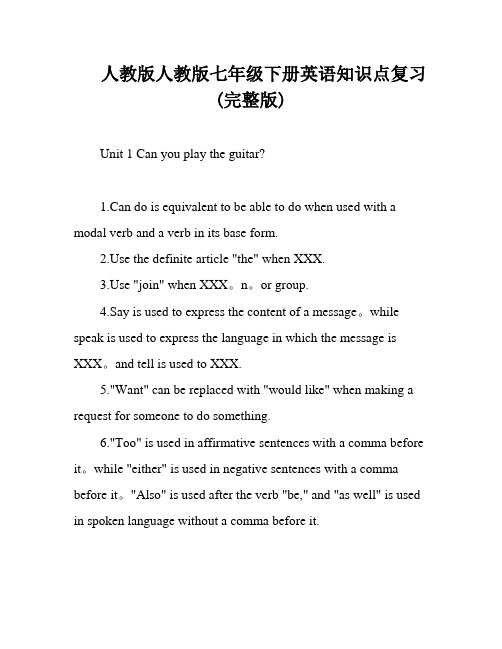
人教版人教版七年级下册英语知识点复习(完整版)Unit 1 Can you play the guitar?1.Can do is equivalent to be able to do when used with a modal verb and a verb in its base form.e the definite article "the" when XXX.e "join" when XXX。
n。
or group.4.Say is used to express the content of a message。
while speak is used to express the language in which the message is XXX。
and tell is used to XXX.5."Want" can be replaced with "would like" when making a request for someone to do something.6."Too" is used in affirmative sentences with a comma before it。
while "either" is used in negative sentences with a comma before it。
"Also" is used after the verb "be," and "as well" is used in spoken language without a comma before it.7."Be good at" is used to XXX or activity。
七年级下册英语Unit知识点

人教版七年级下册英语U n i t知识点文稿归稿存档编号:[KKUY-KKIO69-OTM243-OLUI129-G00I-FDQS58-Unit9名词:height 身高;高度cinema 电影院glasses 眼镜actor 演员actress 女演员person 人nose 鼻子mouth 嘴face 脸eye 眼睛singer 歌手artist 艺术家way 方式;路线end 结尾;尽头动词:may 也许;可能;可以put 放describe 描述形容词:straight 直的curly 卷曲的tall 高的thin 瘦的heavy 重的little 小的medium 中等的handsome 英俊的round 圆形的real 真正的;真实的副词:later 以后differently 不同地兼类词:tonight adv&n(在)今晚;(在)今夜each adj&pron 每个;各自another adj&pron 另一;又一短语:(be)of medium height 中等身高a little 一点;少量look like 看起来像first of all 首先in the end 最后知识点:1、tall 高的反义词 short 矮的,常指人、动物、树、建筑物等很高a tall tree 一棵高高的树a tall building 一栋高楼high 高的反义词 low 低的,多指山高,也指空间位置或程度高,还可以指价格、速度、温度等a high mountain 一座高山high price 价格高2、medium 中等的be of medium height 中等身高be of medium build 中等身材My uncle is of medium height. 我叔叔中等身高。
区分:middle 中间的;中部的There is a tree in the middle of his yard. 他的院子中央有一棵树。
人教版七年级下册英语unit7知识点+经典练习试题(无答案)
人教版七年级下册英语unit7知识点+经典练习题Unit7.It’a raining nowOne:phrases基本词汇1.sunny阳光明媚的;windy.多风的;cloudy.多云的;rainy多雨的;hot热的;warm.暖和的;cool凉爽的;dry干燥的;wet湿润的;humid潮湿的;fine\nice\good天气好的2.rain雨\下雨;snow.雪\下雪;weather report.天气预报3.take a photo/take photos照相;talk on the phone用电话交谈;4.have a good/great time=have fun玩的开心,过的愉快;enjoy 享受oneself(myself\yourself\herself\himself) 玩的开心,过的愉快;5.be on vacation度假;go to vacation去度假;take a message 捎口信;leave a message留口信;answer the phone接电话;call back回电话;No problem没问题;6.Wear a hat戴帽子;wear school uniforms穿校服;wear sunglasses戴太阳镜;Take a photo/take photos/take pictures照相;Two:Sentences必诵句型1(1)-What’s the weather like in Xia Mem?-It’s hot\windy\sunny\rainy\dry\fine(2)-How is the weather in Xia Men?厦门天气如何?-It’s raining天正在下雨;-It’s snowing now正在下雪。
-It’s rainy多雨。
2.(1)-How is it going (with you)?你最近过的怎样?-It’s great\wonderful;It’s pretty good.好极了;-It’s not bad一般;It’s terrible.很糟糕.(2)How is your summer vacation going?你暑假过的怎样?()How is it going with your study?你学习最近怎样?3.(1)It often snows下雪in winter冬天in Harlbin.(2)It often rains下雨in spring春天in Xiamen.(3)It’s raining now天正在下雨;it’s rainy now.现在多雨(be rainy多雨的)(4)The radio says收音机报道it’s going to rain tomorrow.明天将要下雨(5)The weather report天气预报says报道it will be fine天气好this afternoon.(6)It snowed\rained heavily las night.昨晚下大雪\大雨4.-Excuse me,(It’s/This’s)Steven here!may I speak to Maria,please?你好,我是Steven,请找玛丽亚接电话!-(1)This is Maria speaking!我正是(玛丽亚)-(2)Speaking,please!请讲!-(3)Sorry,she isn’t in.很抱歉,她不在。
人教版初中英语7年级下册unit7知识清单+习题 (附解答)
Unit 7 It's raining 一、必背单词:rain v下雨n雨水cloudy adj.多云的snow v下雪n雪cook v做饭park n.公园could modal v能;可以back adv 回来,回原处again adv再一次;又一次dry adj 干燥的cold adj.寒冷的,冷的hot adj 热的warm adj. 温暖的summer n.夏天;夏季juice n. 果汁,饮料soon adv 不久,很快hard adv努力地adj.困难的mountain n.高山skate v滑冰winter n.冬天;冬季windy adj多风的sunny adj.晴朗的weather n.天气bad adj.坏的;糟的message n.信息;消息problem n.困难;难题visit v拜访;参观vacation n.假期Europe n.欧洲country n.国;国家snowy adj.下雪的winter n.冬天,冬季Russian adj. 俄罗斯的,n.俄罗斯人,俄语rainy adj.阴雨的;多雨的二、常考短语summer vacation 暑假not bad不错in the park在公园have a good time/have a great time/have fun/enjoy oneself过得愉快take a message for….为…捎个口信call(sb.)back(给某人)回电话no problem没问题right now现在talk on the phone通过电话交谈some of…当中的一些by the pool在游泳池边drink orange juice喝橙汁study hard努力学习on a vacation在度假in the mountains在山里call sb.给某人打电话write to sb.给某人写信right for…适合…take a photo of..给…照相in the rainy weather在下雨的天气里How’s the weather?=What’s the weather like?天气怎么样?How’s it going?近来可好?Sounds like..听起来…tell sb.(not)to do sth.告诉某人(不要)做某事have a great time(in)doing sth愉快地做某事be happy to do sth.高兴做某事just right for doing sth.做某事正合适want to do sth.想要做某事三、重点句型:1. ---How's the weather in Shanghai? ---It’ s cloudy./It’s sunny./It’s raining2. ---How’s it going?---Great/Not bad./Terrible3. Sounds like you're having a good time4. Can I take a message for him?5. Could you just tell him to call me back?6. It's hot in your country now, isn’t it?7.I’m having a great time visiting my aunt in Canada.四、重点语法:现在进行时态(Ⅱ)1.Sounds like you’re having a good time.听起来你玩得好开心。
七年级下册英语68页笔记
七年级下册英语68页笔记内容很多,建议先收藏保存。
写一个码字不容易。
如果觉得不错,可以给它点个赞。
人教版七年级下册英语课本知识点总结Unit 1 Can you play the guitar?◆短语归纳1. play chess 下国际象棋2. play the guitar 弹吉他3. speak English 说英语4. English club 英语俱乐部5. talk to/with 跟…说6. play the violin 拉小提琴7. play the piano 弹钢琴 8. play the drums 敲鼓 9. make friends 结交朋友10. do kung fu 练 (中国) 功夫 11. tell stories 讲故事12. play games with sb 和某人一起做游戏13.join swimming club加入游泳俱乐部 14.the old people’s home老人之家15.call sb at+号码拨打...给某人 16. on the weekend/on weekends 在周末 17.help sb with sth 在某方面帮助某人◆典句必背1. Can you draw? Yes, I can. / No, I can’t.2. What club do you want to join? I want to join the chess club.3. You can join the English club.4. Sounds good./That sounds good.5. I can speak English and I can also play soccer.◆考点1,情态动词+V原 can do= be able to do2, play +棋类/球类下……棋,打……球 play the +西洋乐器弹/拉……乐器3, join 参加(社团、组织、团体) join+ 人 jointhe …club 加入…俱乐部4, 4个说的区别:say+内容speak+语言talk 谈论 talk about sth谈论某事 talk with/ to sb 与...说话tell 告诉,讲述 tell sb (not)to do sth 告诉某人(不要)做某事tell stories/ jokes 讲故事 tell sb about sth告诉某人关于某事5, want= would like +(sb)to do sth6, 4个也的区别:too 肯定句末(前面加逗号)either否定句末(前面加逗号)also 实前be 后as well 口语中,句末(前面不加逗号)7, be good at+ V-ing=do well in 擅长于be good for 对…有益(be bad for对…有害)be good to 对…友好(good 可用friendly,nice,kind替换)be good with和…相处好=get on/ along well with8, How/ what about+V-ing …怎么样?(表建议)10,感官动词(look, sound, taste, smell, feel)+形容词11,选择疑问句:回答不能直接用Yes或者No,要从中选择一个回答12,students wanted for school show(wanted表示招募,含有被动意义)13,show sth to sb=show sb sth 给某人展示某物 give sth to sb=give sb sth14,help sb (to)do sth 帮助某人做某事help sb with sth 帮助某人某事with sb’s help= with the help of sb 在某人的帮助下Help yourself to 随便享用15,be busy doing sth/ be busy with sth 忙于做某事,忙于某事16,need (sb)to do sth 需要(某人)做某事17,be free= have time 空闲18,English-speaking students 说英语的学生(带有连词符,有形容词性质)19. make用法①“ 制造” make a cake.制作蛋糕②“使成为” make sb. / sth. + adj./V原意为“使某人……”③make friends “结交朋友” make friends with sb. “和……交朋友”◆话题写作Dear Sir,I want to join your organization (组织) to help kids with sports, music and English. My name is Mike. I am 15 years old. I’m a student in No. 1 Middle school. I can play the guitar well. I can sing many songs. I can swim and speak English well, too. I think I can be good with the kids. I also do well in telling stories.I hope to get your letter soon.Yours,MikeUnit 2 What time do you go to school?◆短语归纳1. what time 几点2. go to school 去上学3. get up 起床4. take a shower 洗淋浴5. brush teeth 刷牙6. get to 到达7. do homework 做家庭作业 8. go to work 去上班 9. go home 回家10. eat breakfast 吃早饭 11. get dressed 穿上衣服 12. get home 到家13. either…or… 要么…要么… 14. go to bed 上床睡觉15. take a walk 散步16. lots of=a lot of 许多,大量 17. radio station 广播电台 18.吃得快 eat quickly19. at night 在晚上 20. be late for=arrive late for ...迟到 21.从...到...from...to...22.at the weekend/at weekends在周末 23.尝起来不错taste good 24.过着健康的生活live a healthy life◆典句必背1. What time do you usually get up? I usually get up at six thirty.2. That’s a funny time for breakfast.3. When do students usually eat dinner? They usually eat dinner at a quarter to seven in the evening.4. In the evening, I either watch TV or play puter games.5. At twelve, she eats lots of fruit and vegetables for lunch.6. She knows it’s not good for her, but it tas tes good.◆考点1、on/in/at辨析(1) at+钟点,或固定搭配at noon在中午, at night在晚上(2) in +月、季节、年、世纪,或固定搭配in the morning /afternoon/evening在早上/下午/晚上(3) on +具体某一天/星期几或具体某一天的早中晚以及带有修饰词的早中晚on April 1st on Sunday on a cold winter morning2、时间读法:顺读法逆读法:分钟≤30用past five past eight(8:05) half past eight(8:30)分钟>30用to a quarter to ten(9:45)整点用…o’clock 7 o’clock(7:00)几点半:half past+时刻 15分钟:a quarter▲问时间用what time或者when3、 4个穿的区别:wear 表状态,+服装、手套、眼镜等put on 表动作,+服装dress 表动作,+sb./ oneself get dressed穿衣\in 介词 +颜色4、频度副词(实前be 后)always(总是) usually(通常) often(经常) sometimes(有时) seldom=hardly(几乎不) never(从不)5、一段时间前面要用介词for for half an hour for five minutes6、either…or....连接2个并列的成分,若连接2个名词或代词作主语时,谓语动词与最近的名词或代词保持一致,即遵循就近原则7、a lot of=lots of+可数n复数/不可数n a lot修饰动词8、exercise v.锻炼 u.n.锻炼 c.n练习题,某种具体的锻炼做运动take exercise=do exercise9、工作 job &workjob 可数n.work v.工作不可数n.工作可数n.作品 go to work 去上班10、tooth---(复数) teeth11、It is +adj.+for sb. +to do sth. (adj.修饰to do sth., it形式主语)It is important for me to learn English.◆话题写作主题:谈论日常作息习惯My School DayI am a student. I usually get up at seven, and I eat breakfast at seven thirty. Then I go to school at eight. School starts at eight thirty. I eat lunch at twelve. I go home at 17:00. I often eat dinner at19:00 and then play the piano. I do my homework at 20:00. At 22:00, I go to bed.Unit 3 How do you get to school?◆短语归纳1. get to school 到达学校2. take the subway 乘地铁3. ride a bike 骑自行车= by bike4. how far 多远5. from home to school 从家到学校6. every day 每天7.have a good time过得愉快 7.乘索道go on a ropeway 9.cross the river过河10. bus stop 公共汽车站 11. think of 认为 12. between... and... 在…和…之间13. have to do sth不得不做某事 14.我不确定I’m not sure 15. e true 实现16. one 11-year-old boy 一个11岁的男孩 17. 步行去学校walk to school=go to school on foot18.. Thanks for doing sth 因做某事而感谢你◆用法集萃1. take… to …= go to … by… 乘…去…2. How do / does (sb.)get to …? …是怎样到…的?3. How far is it from … to …? 从…到…有多远?4. It takes sb. some time to do sth. 做某事花费某人多长时间。
七年级下册人教版英语unit7知识点
七年级下册人教版英语unit7知识点Unit 7 in 7th grade English curriculum involves learning about the English language as well as enhancing one's reading and writing skills. This unit mainly emphasizes learning new words and phrases, sentence structure, and grammar concepts. By the end of this unit, students should be able to express themselves in both spoken and written English with ease while using the appropriate vocabulary, sentence structure, and grammar.VocabularyThe unit 7 vocabulary list includes words related to school subjects, activities, and facilities. Students learn how to pronounce, spell, and use these words in sentences.A good way to memorize vocabulary is by creating flashcards. Each card should have one word on the front and its meaning on the back. Students can also use the words in sentences to reinforce their understanding of how to use them correctly.Sentence StructureStudents learn how to use adjectives, adverbs, and prepositions to add more detail to their sentences. They also learn how to use conjunctions to join two or more sentences together.Sentences in English follow a specific structure known as subject-verb-object. Understanding this structure helps students write sentences that are grammatically correct. It is also important for students to learn about the different tenses, such as the past tense and future tense, as they are used to express actions or events that have already happened or are yet to occur.Grammar ConceptsOne of the key grammar concepts in unit 7 is the use of verbs. Verbs show action, and it is important to know how to use them correctly to convey the intended meaning. Students learn about the basic forms of verbs, such as the infinitive, present participle, and past participle.Another grammar concept that students learn in this unit is the proper use of pronouns. Pronouns replace nouns in a sentence and help to avoid repetition. Students also learn about the different types of pronouns, such as personal, possessive, and reflexive pronouns.Reading and Writing SkillsUnit 7 also emphasizes the development of reading and writing skills. Reading helps students expand their vocabulary, comprehend grammar concepts, and understand sentence structure. Writing, on the other hand, helps students express themselves using the right words, sentence structure, and grammar.One way to improve reading and writing skills is by practicing with exercises or activities that provide context for the vocabulary and grammar concepts learned in this unit. For example, students can read short stories or articles related to school subjects and then answer questions to test their comprehension.Final ThoughtsIn summary, unit 7 of the 7th grade English curriculum is designed to help students improve their English language skills. It teaches them new vocabulary words and phrases, sentence structure, and grammar concepts. By the end of this unit, students should be able to effectively communicate their thoughts and ideas in both written and spokenEnglish using the appropriate vocabulary, sentence structure, and grammar.。
- 1、下载文档前请自行甄别文档内容的完整性,平台不提供额外的编辑、内容补充、找答案等附加服务。
- 2、"仅部分预览"的文档,不可在线预览部分如存在完整性等问题,可反馈申请退款(可完整预览的文档不适用该条件!)。
- 3、如文档侵犯您的权益,请联系客服反馈,我们会尽快为您处理(人工客服工作时间:9:00-18:30)。
1 Unit 7 It’s raining ◆短语归纳 1. not ______ 不错 2. _____ the park在公园 3. _____ a message ____ … 为„捎口信 4.play _____ sb. 和某人玩耍 5. call sb. _____ 给某人回电话 6. ______ problem 没问题 7. talk ____ the phone通过电话交谈 8. _____ now=at once 现在 9. some ____ …„当中的一些 10. _____the pool 在游泳池边 11. learn ____ ______学习很多 12. study ______ 努力学习 13. ______a good time /have ______过得很愉快 14. ______ a vacation 在度假 15. ______the mountains 在山里 16. ______ one’s country 在某人的国家 17. write ____ sb. 给某人写信 18.just right ______… 适合„ 19. ____the snow 在雪地里 20. ____ _ a photo of 给„拍一张照片 21. ____ a river 在河面上 22. go ______ 溜冰
◆典句必背 1. ____ _ the weather? 天气怎么样? 2. ____ _cloudy. / It’s sunny. / It’s raining./It’s hazy天气多云/天气晴朗/ 天正下雨/雾霾天气 3. ____ _ ____ _ going? 情况怎么样? 4. ____ _! / ____ _ ____ _./ Terrible! 好极了!/ 不错。/ 糟糕! 5. Can I ____ _a message____ _ him? 我给他捎个口信好吗? 6. I’m having a great time ____ _____ _ my aunt in Canada. 我正在加拿大愉快地拜访我的姨妈 7. My family and I are ____ _a vacation ____ _the mountains. 我和我的家人正在山里度假。 8. It’s hot ____ _ your country now, ____ _ it? 现在你的国家天气炎热,不是吗?
◆用法集萃 1. cook 1)v. 做饭 —cooker n. 厨具 cook sb. sth.= cook sth. ______sb. 为某人做饭—My mom often cooks ______ us. 2)cook n. 厨师 –My dad is a ______. 2.sound 为系动词―听起来‖后加______ 。―听起来...‖--That sounds ______ (good/ well). sound like ―听起来像...‖ 后加______ 或______ .---That sounds ______ a good idea. 3. have a great (good) time/have fun + (in) ______sth. 愉快地做某事 -- They are having a good time______(play)football now. = They are having fun______(play)football now. 4. 1. tell sb. ______ (do) sth. 告诉某人做某事—My teachers tell us______ (study) hard. 否定形式为:tell sb. ____________ (do) sth. 告诉某人不要做某事 -- My teachers tell us______ (not fight) at school. 5. How’s it going?―最近怎么样‖是询问―对方处境或事情进展如何‖的习惯用语,相当于How is everything?即:How’s it going ?=How is everything? 常用答语:Great! 好极了!Not bad!还不错! Terrible! 糟糕透了! Pretty good! 相当好! Just so-so! 一般般 (1).( )---_____ it going?---Pretty good! A. How’s B. What does C. What’s D. Where’s (2). How’s it going? (同义句转换)________________________ (3)--How’s it going______ you?-- ______ ______ 不错。 6.a lot 名词短语,意为―很多,大量‖—My mom gives me ______ ______ (很多)to eat. a lot 可作副词短语,在句中作程度状语,意为―很;非常‖ --We learn ______ ______ (很多)in the school. 7.be happy ____________ (do) sth. 意为―高兴做某事‖—He is happy __________ (see) you. 8. ______ a vacation= ______ a holiday在度假;在假期中--They are ______ a vacation now. 9. write ____ sb. = write sb. a letter给某人写信.—Mary often writes____ her friend. 10. just right for________ (do) sth. 做某事正合适—The sunny day is just right for________ (swim) . 11.It’s hot in your country now, isn’t it? 这是个__________疑问句。 反意疑问句即附加疑问句,用来询问对方的看法或对某事没有把握需要对方证实。反意疑问句由 2
两部分组成:―陈述句+简短的疑问句‖,两部分的人称及时态应保持一致。反意疑问句遵循以下原则:(1)陈述部分肯定+疑问部分__________;(2)陈述部分否定+疑问部分__________。 Eg: (1).It’s rainy today, _________ it? 今天下雨,不是吗? -(2).They work hard, _______they? 他们工作努力,不是吗? ◆语法点和常见用法 一、询问天气的句型及其答语. 1.询问天气的句型:常见的询问天气的句型有:_______ the weather? = _______ the weather like?两个句型后面都可以加―_______ + 地点‖,用以询问―某地天气如何‖ 2.回答询问时用:―_______ +表示天气的_______词‖。常见的该类形容词有:_______ (晴朗的) ______(干燥的);_______(温暖的);_____( 寒冷的) ;_____(凉爽的) ;____(炎热的);_______ (下雨的) ;_______ (下雪的) ;_______ (多云的)等。 同时也可以用现在进行时进行回答:It’s _______( rain)/(snow) 正在下雨/ 下雪。 例1:How’s the weather in Shanghai?( 同义句转换 )
例2.--- ___________________---It’s sunny today. A.How was the weather yesterday? B.How are you doing? C.What fine weather! D.What’s the weather like today? 例3.—How’s the weather there?-Great. It’s ______.I can make a snowman tomorrow. A.rainy B.sunny C.cloudy D.snowy 例4.连词成句: is What Beijing like the weather in--______________________________________ 例5.单句改错: 1. How is the weather like? ( )_________ A B C D 2. The weather is windy and rain. ( ) _________ A B C D 二 、现在进行时 1.用法: (1)表示说话时动作正在发生或进行。--They _________(watch) TV.他们正在看电视。 (2) 表示现阶段正在发生或进行的动作,并不限于说话时特定的时间范围内进行的动作。 --He _________(work) hard at his lesson this year. 今年他一直在努力学习。 (3)有些动词的现在进行时用来表示按计划或安排将要进行的动作。如come,go,arrive,leave,start,stay等表示位置移动的词。--I _________( leave) tomorrow.我明天动身。 --My parents _______________(come) back tomorrow.我的父母明天回来。 (4)有些动词,如know,lie(位于),have,own(拥有),belong to(属于),like,love,want,hope等,通常不用于进行时态。--I like going shopping with my friends. 例6.单句改错: --Are his parents watch TV? ( )___________ A B C D 例7.---Look at the picture! What’s the man doing?---He is _______ a camel(骆驼) A.ride B. to ride C. rode D.riding 例8. There are come boys_____ soccer in the playground. A.play B.playing C. are playing D.plays 例9.用括号括号内所给单词的适当形式填空。 1.---What _____ they _____(do) over there? ---They’re talking about a movie. 2.My father _____(cook) in the kitchen now. He’s a good _______(cook). 注:cook “做饭”“厨师” cooker“炊具” 3. It _______ _(snow) in Moscow now. 4.Jeff often ____ _(play) computer games. 5.It’s 6:00 in the evening .The Green family ____ ___(have) dinner.
